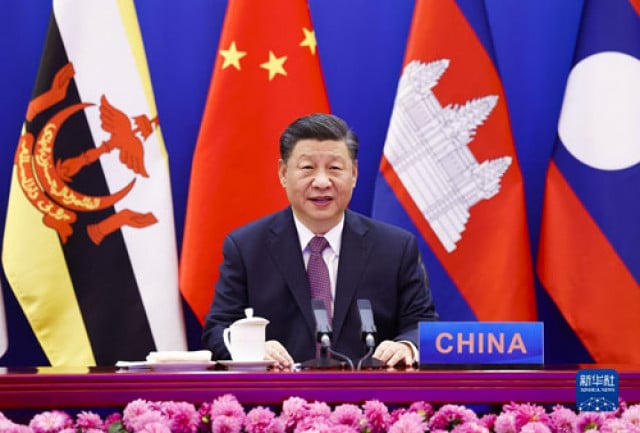China Needs Asia Allies Against US

- By Vun Phanith
- July 7, 2022 5:24 PM
Beijing takes aim at American dominance
China must exert and strengthen its sphere of influence in Asia to triumph over the US in a complex and changing geopolitical landscape. It must also ally with ASEAN states to maintain Beijing’s status quo.
Growing US hegemony in the Asia-Pacific region has seen a tendency of some ASEAN states to take sides by using a Free and Open Indo-Pacific Initiative as a counter-measure to the Chinese Belt and Road Initiative.
In the wake of the emerging US threat, China has been cautious in pursuing its core interests in the region, steadily deepening Beijing’s ties with US allies.
In Asia, China’s rising profile continues to undermine America’s leading and dominating role in providing billions of dollars to developing countries including Cambodia, Laos, Myanmar and Vietnam.
Using historical examples, the negative records made China realize that the rising powers of Germany prior to WWI and Japan prior to WWII were the most dangerous players and encouraged their allies to work against other rising powers, which eventually led to intensified war competition to solve problems.
With this in mind, Chinese leaders acted to avoid this scenario as Chinese rose, seeing the rising profile of America in Asia as the main threat.
The future confrontation between Washington and Beijing is unpredictable, leading China to be wary of negative US reactions to its growing influence and power in Asia. Therefore, if China responds to the states without proper strategic considerations, its interests will be undermined.
For example, during the Bush administration, China was aware of the US’s complicated divisions, which resulted in allowing North Korea to conduct provocative actions in 2003 and making the 1994 US-North Korea Agreed Framework agreement vulnerable.
Consequently, the government faced challenges during that period because of its unclear anticipation and abandonment of multilateral measures seen as critical to long-term Asian stability.
Another failure in the Bush administration’s history was poor leadership in consolidating small states. Following the US invasion of Iraq, China perceived that the US did not pay close attention to the root causes of terrorism and instead intervened to destroy one country without taking responsibility. More importantly, it held the United Nations in contempt and attempted to justify its unilateral dominance in other parts of the world.
The attack in Iraq on Muslim populations raised negative perceptions among Muslim countries in Southeast Asia, making Indonesia and Malaysia criticize the fueling of radical movements in the Middle East.
The US would have been criticized if it tried, as it did in Iraq, to overthrow the regime in North Korea where Chinese interests are at stake. Hence, China’s belief is true that US primacy in Asia remains strong and is a more obvious concern than Iraq.
Despite some criticism of US President George W. Bush during the Iraq war, Bush later re-established good relations with most of the Asian powers, including Japan, South Korea, Australia and India. These countries appreciate the US security commitment and military presence in the region to thwart the rise of China.
For example, the magnitude of the deployment of US forces in South Korea has prompted China to increase its military capability against American forces on the Korean peninsula.
Economically, Chinese leaders recognize that the US economy plays an important role in generating growth for its own development and that of Asia in general.
America absorbs about 40% of Chinese exports, one-third of Japanese exports and about 20% of exports from South Korean, Taiwan, and ASEAN.
Moreover, US FDI has increased significantly in China, but relatively less than in Japan, Singapore and Australia. In this sense, the growing military role of the US in other parts of the world, after the 9/11 attack, has become significant and pre-eminent, especially after the defeat of Japan in World War II and the overthrow of Iraqi dictator Saddam Hussein in 2003.
Regarding the South China Sea issue, the claimant states are always tempted to bring in the presence of America, which China sees as a critical threat to its core interests in the surrounding areas.
The prominence of the US in the region has provided China with strategic calculations and concern for the American role in Beijing’s gradual rise. For example, China always uses a policy of unilateral action to resolve maritime issues within those shared borders or prefers ASEAN-led mechanisms to address and reject the influential role of the US in the region, even though the presence is welcomed by some ASEAN member countries, including the Philippines, Vietnam, and Malaysia.
It is apparent that the Chinese official development assistance has increased dramatically, letting its allies in Southeast Asia bolster a shield against the US policy of strategic ambiguity.
It is important to put into perspective that the US security policy in Asia has led to an underlying cause of China’s growing influence in the region.
US engagement with Asia in terms of economy and security and pressure on human rights provokes China’s aggressive response and prompts it to provide more financial assistance to other countries in the effort to counter the US influence.
The growing supremacy of the US never makes China abandon its economic ties with non-American allies in Asia or stops it from seizing this opportunity to strengthen Beijing’s leadership and become the key economic player in Asia.
VUN Phanith is JICA scholar at Ritsumeikan University
Contact: [email protected]















